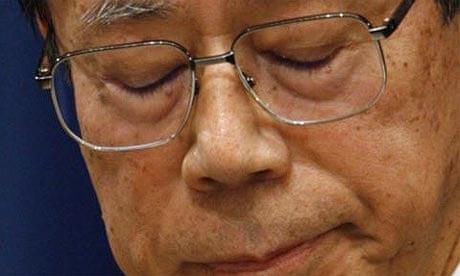Japan's beleaguered prime minister, Yasuo Fukuda, resigned today less than a year after taking office in a shock move that threatens to plunge the world's second-biggest economy into a new round of political turmoil.
Faced with poor poll ratings, policy deadlock and mounting economic problems, a grim-faced Fukuda said he had decided several days ago to step down to avoid creating a "political vacuum".
Fukuda's resignation leaves the door open for Taro Aso, an outspoken rightwinger whom Fukuda made secretary general of the ruling Liberal Democratic party (LDP) in last month's cabinet reshuffle.
At a hastily arranged press conference in Tokyo, Fukuda conceded the reshuffle and the announcement last week of $107bn (£60bn) in extra spending and tax cuts had failed to boost support for his deeply unpopular administration.
Faced with an upper house controlled by opposition parties, Fukuda failed to push through key legislation since taking office last September.
Opposition parties in the upper house, led by the Democrats, blocked government bills and appointments, including Fukuda's preferred candidate to be governor of the Bank of Japan.
Last November, Japanese ships were forced to temporarily withdraw from a refuelling mission in support of US-led forces in Afghanistan after the upper house refused to extend it.
After several failed attempts to compromise with the Democrats' leader, Ichiro Ozawa, Fukuda appeared to have lost the stomach for another fight with his former LDP colleague-turned political nemesis.
"The power struggle in parliament has caused me many headaches," said Fukuda. "I have tried to talk things through with the opposition, but they have voted against every single important government bill.
"I want to tell Mr Ozawa that he needs to put the country first, that it would have been better had he and I engaged in an honest dialogue."
Ozawa, who in June orchestrated a censure motion against Fukuda in the upper house, said this week he would stand for a third term as the Democrats' leader later this month.
Speculation that Fukuda would resign mounted after his authority was badly shaken in a row over the timing of the next parliamentary session. He had wanted parliament to meet last month to vote on the Afghanistan refuelling mission. But this was opposed by members of his own party and the LDP's junior partner, New Komeito, who feared the debate would further damage the coalition's standing.
The government was also rocked by widespread anger over health insurance reforms that have forced many patients over 75 to pay more for medical treatment.
Fukuda's resignation promises to bring yet more political instability to the world's second-biggest economy. His predecessor, Shinzo Abe, resigned one year after taking office due to sagging popularity and poor health.
"We can't allow progress to be stalled further, we must not create a political vacuum," he said. "Policy must be allowed to move forward so I have decided to step down as prime minister. I believe that now is the appropriate time as it will not inconvenience the Japanese people. The Japanese economy and Japanese people's livelihoods are at stake."
Fukuda admitted depressing poll figures had been a factor in his decision to resign before the next parliamentary session begins on September 12. "The cabinet's approval rating is an issue. I felt we were on the brink of a political vacuum and, if that were to occur, that it would be very damaging to the Japanese people."
Despite repeated opposition calls for a snap election, some observers expect the new leader to attempt to rebuild the party's popularity before the next general election is due in September 2009.
Analysts said Fukuda had created the very vacuum he was so desperate to avoid. "This is two prime ministers in a row... the political vacuum will be at least two weeks, more like a month," said Koichi Nakano, a political science professor at Sophia University.
"Nothing will get done. It is quite likely that there will be pressure for the LDP to call an election as soon as possible. Certainly, this is not anything that can be condoned. It is unheard of, even by Japan's standards."
An opinion poll today showed support for the government was at 29%, despite the launch of the economic stimulus package only days earlier. The same poll said Aso – the gaffe-prone former foreign minister – was the most popular choice to be next leader with 26% naming him, compared with just 5% for Fukuda and 8% for Ozawa.
